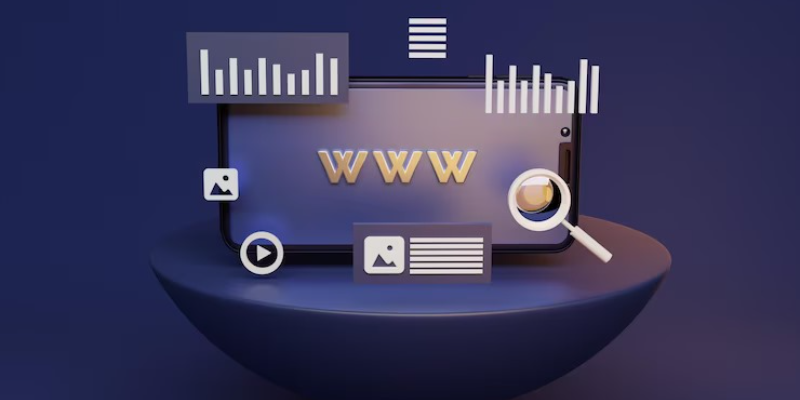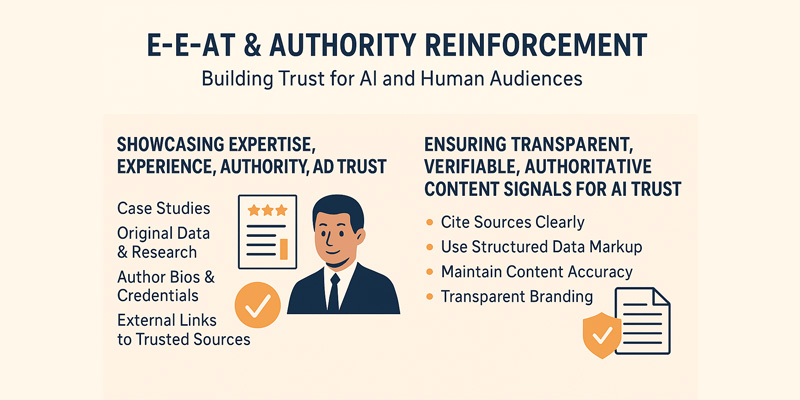

Off-page SEO optimization refers to all the activities carried out outside your website to improve its visibility, authority, and trustworthiness in the eyes of search engines. These off-page SEO techniques include actions such as link building, brand mentions, content promotion, and social media engagement — all aimed at signaling to Google and other search engines that your site is valuable, credible, and relevant to user queries.
Even in the era of AI-powered search, where platforms like Google Search Generative Experience (SGE) and Bing AI summarize content directly on the results page, off-page SEO techniques remain crucial. AI-driven search engines still rely heavily on signals such as backlinks, brand mentions, and online authority to determine which sources are trustworthy enough to be featured in AI-generated answers.
By investing in off-page SEO now, you’re not just ranking higher in traditional search results — you’re also increasing your chances of being cited, linked, or featured within AI-generated summaries. In other words, off-page SEO is no longer just about search rankings; it’s about securing long-term brand visibility in both search and AI-driven experiences.
The July 2025 Google Core Update introduced a significant shift in how search engines evaluate and rank web content, especially in the era of AI Mode—Google’s generative search experience that blends AI-powered summaries with traditional organic results.
For off-page SEO techniques, this update places even greater emphasis on authority signals and contextual relevance. This means that it’s no longer enough to just build backlinks from high-domain-authority sites; the context in which your brand is mentioned, and the topical alignment between your website and the referring domain, are now critical ranking factors.
For years, backlinks have been the backbone of off-page SEO techniques, serving as votes of confidence for your website. In 2025, while backlinks remain important, citational authority—being mentioned and referenced as an authoritative source across trusted platforms—is emerging as a stronger signal, especially in AI Mode rankings.
As far as off-page SEO is concerned, link-building is still considered to be one of the most influential SEO strategies. If other reliable websites link to your content, then it means that they consider your site to be reliable and worthy of linking. Here are some effective link-building strategies:
Guest Posting: Write and submit articles of good quality in the relevant blogs and websites that are within the industry. This not only aids in getting you the backlinks but also creates brand awareness among the public. While considering which sites are good to partner with in terms of guest blogging concentrate on one that has a high Domain Authority and active users.
Broken Link Building: Look for other websites that provide similar content as yours and offer ways to improve on the broken links. The technique can help webmasters to correct the broken links and at the same time offer you quality backlinks.
Resource Link Building: Provide information on your website that other websites will want to link to so that you do not have to solicit link exchanges. It may be detailed articles, data visualization, or studies that the authors came up with by themselves.
Even though indicators from social media do not influence rankings, active work in social networks will be useful for SEO activities. Post representative content on multiple social media networks to reach as many people as possible to spread the word about your business, provide a link for consumers to your site, and encourage consumers to share your information with others.
Multipurpose use of blog posts and other types of content having created your blog posts, infographic, or any other content piece, remember to share it on your social media handles. Domain content can possibly be related to the growth of backlinks, and followers should be encouraged to share and discuss with others concerning the domain content.
In off-page SEO, high-quality content that can be shared with the various site’s audiences is crucial. Your content plan should focus on your audience’s wants and will incorporate keywords. Some effective content marketing tactics include:
Widening the production of lengthy articles, containing much valuable information for the readers. To create well-designed, attractive layouts of the infographics that can be easily shared. Creating videos that will be interesting and amusing to the audience hence being shared on the various social platforms. Creating research articles or case studies that can be useful to other professionals working in the same field.

Brand mentions and citations that you get across the web have a huge influence on your off-page SEO techniques. Not all the time the potential customers will include a direct link to your site; however such mentions help build an authoritative brand online. Make your products or services ready to satisfy your consumers, and let them give their testimonies on social media sites, blogs, and forums where your business is likely to be mentioned.
Hence, local SEO can be considered off-page SEO for businesses that have a physical spot where people can visit. It also involves claiming and verifying your organization on Google My Business, verifying that your organization’s information is accurate in other online listing platforms, and encouraging potential customers to leave reviews on platforms such as Google, or any other reviewing platforms depending on the industry.
Such influencers are helpful when it comes to the promotion of your brand and also, are good sources of backlinks. Have a relationship with influencers to produce content, lead webinars or sponsor an occasion with reference to your organization’s personality and target market.
Often visit the forums, threads, and open questions that are close to your area of specialization. It is okay to express your professional knowledge to answer questions and give information but avoid being too commercial. It could give an appearance of credibility in your specific field and lead individuals to your site.
Producing your own podcasts and hosting or guest participation in webinars can help you get more people to your website and get other websites to link back to you. Discuss your fields of interest to enable you to share vital information with the listeners and alert them to visit your website for more information or resources.
It has been seen that with time, the importance of press releases in populating search engine rankings has drastically fallen, but at the same time, they continue to serve as one of the methods of gaining media coverage, and in the process, there is always the possibility of gaining high-quality backlinks. Being clear on the timing and subject of Press Releases, it is important to concentrate on the matters of interest to the public and/or officially announced which means sending your Press Releases through channels that can be considered trustworthy.

In the evolving world of off-page SEO techniques, winning rankings isn’t just about backlinks—it’s about being trusted enough to be referenced, cited, and surfaced in both traditional SERPs and AI-powered search results. This is where E-E-A-T—Experience, Expertise, Authority, and Trustworthiness—comes into play.
Google’s July 2025 Core Update and AI Mode rollout have made E-E-A-T signals even more critical. AI-generated summaries now prioritize content that is verifiably accurate, created by credible sources, and supported by authoritative mentions across the web.
To reinforce your E-E-A-T, your content must prove it comes from knowledgeable, experienced professionals in your niche.
Practical ways to demonstrate E-E-A-T in your off-page SEO strategy:
In AI Mode, Google’s generative algorithms don’t just scrape for keywords—they evaluate the integrity and traceability of your content. Transparency and verifiability are key to becoming a cited source in AI summaries.
Best practices to strengthen AI trust signals:
However, they can be tracked and measured to increase the effectiveness of the off-page SEO strategies in place. Check your Google Analytics, Google Search Console, and other SEO tools in order to analyze the backlinks pointing to your site, referral traffic, and positions in the search engines.
Make sure you assess your off-page SEO regularly, and perhaps, make some changes to your strategy regarding it. Some key metrics to track include:
- Quality and quantity of link sites
- Even though referral traffic mainly comes from a company’s internal sources, it also includes traffic from external sources such as through other sites.
- engagements on social media and sharing
- Brand name hits on the web
- Brand recognition in a certain local area and reviews
The success of these off-page SEO strategies cannot be instant; therefore, make sure to be consistent when practicing them. As for any search engine optimization effort, creating authority and improving one’s positioning takes time, but once the tactics are properly implemented, the changes are noticeable and the traffic to your site will increase.
Off-page SEO is one of the most important aspects of any form of digital marketing. Using these top off-page SEO techniques, you can increase your website's reputation as well as its search engine ranking. Off-page SEO is a continuous process that needs time and requires constant changes and modifications based on the search engine’s policies and market situation.
For those who would require the services of professionals to assist in a company’s SEO campaigns, then it is advisable to deal with an SEO company Bangalore or any SEO company in the region. With the help of specific off-page SEO specialists, you can create and enforce off-page SEO solutions that can efficiently work together with on-page ones and bring lasting results to your enterprise.